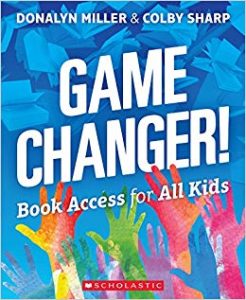Game Changer! Assuring Book Access for All Kids
Game Changer! Book Access for All Kids
By Donalyn Miller and Colby Sharp
(Scholastic, 2018 – Learn more)

This is the crux of Donalyn Miller and Colby Sharp’s argument: Get books into the hands of kids and then give those kids with books in their hands the time they need to read!
Throughout their latest book – Game Changer! – these two literacy advocates make a plea for dedicated independent reading time and choice in books for all students in all schools, and they push back particularly hard against the notions of narrow reading spectrums, often governed in some schools by a strict adherence to assessment-driven reading levels.
They worry out loud about “book deserts,” and they want to spur on a “book flood.”

Alas, it also reminded me of a story my niece and son told me years ago of their former elementary school library, where the librarian refused to allow my niece to take out a certain book – it may have been a Harry Potter novel, if I remember correctly – “because it is not in your grade section.”
Who lets people like that run a school library?
We level texts, not readers
It wouldn’t be Sharp and Miller, if they had anything to say about it. They note repeatedly that leveled reading systems apply to the text and not to the reader. Repeat: we level texts, not readers. They push back on the trend of reversing that understanding – of levels assigned to students – by celebrating throughout Game Changer those many inventive librarians and teachers who will do whatever it takes to get kids reading – in school, out of school, in stolen moments, wherever and whenever.
Sure, Miller and Sharp can and do cite the research that shows clearly the connection between extended independent reading time and academic achievement. But they also know from their own classrooms and their own experiences the power of a dedicated period of time to read (at least 30 minutes a day) and of how the identity of a reader can transform a sense of learning beyond the book itself for many students, including those who struggle with academics.
Meeting challenges to increased reading
Sharp and Miller go on to tackle issues of summer reading programs (avoid the incentives, they suggest, if you want to build an intrinsic value of reading); finding ways to provide free books to children in poverty and situations where such ownership may not otherwise be possible; encouraging teachers to be always reading, too, and to make that reading life visible to students; and establishing administrative support for independent reading (one might think this would be a given, but not always, and not in every school).
Not surprisingly, Miller and Sharp were two of the co-founders of The Nerdy Book Club, a website community and a popular Twitter hashtag devoted to teachers, readers and books – and that same celebratory spirit comes through Game Changer.
What I appreciate here is that they understand the difficulties of carving out time and space in the school day, every single day, for extended independent reading for all children. The era of standardized testing and data collection makes this move more difficult than ever for classroom teachers.
They tell us to do it anyway.
“It’s going to take all of us.”
And they remind us to be relentless in this mission, in the ways we reach out to the larger community, in the ways we support families, in the way we expand our school libraries, in the ways we are thoughtful of culture and language and gender when choosing books, and in the ways reading helps learning across all content areas.
They write: “Let’s be clear: It’s going to take all of us. A sustained, organized, and unwavering commitment to these goals will be the only way we can change the institutional and social structures preventing young readers from receiving the book access, expert instruction, and home support they need.” (Miller/Sharp, page 119).
Yes, indeed.
If you own the book, you can also access a valuable resource in which the authors engage in deep video conversations related to the themes of the chapters. That video archive is available through the Scholastic online resource: https://www.scholastic.com/GameChangerResources
______________________________________________
Kevin Hodgson is a sixth grade teacher in Southampton, Massachusetts, and is Co-Director for Outreach with the Western Massachusetts Writing Project. Kevin blogs regularly at Kevin’s Meandering Mind and tweets more often than is healthy under his @dogtrax handle. For several wonderful years, he wrote a regular blog here at MiddleWeb: Working Draft.































Yes! to school librarians serving as literacy partners and school libraries providing resources and support for students, classroom teachers, parents, and community! It takes a village to inspire, motivate, and teach future ready lifelong readers and learners.
It sure does, and the more we talk about this and the more we share about this, and the more books we can get into our students’ hands, the better. Thanks for taking time to comment, Judi.
Kevin